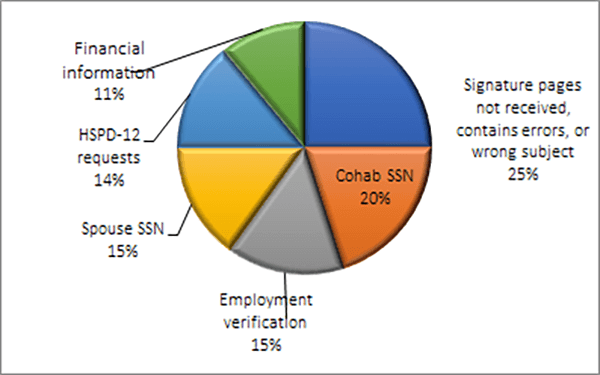If you’re applying for a national security position today you can expect a one-to-two-year wait for a final security clearance determination. The good news interim security clearances can frequently allow individuals to get to work in as little as 30 days, with 35 days being the average processing time for the issuance of an interim clearance today.
Unfortunately, despite the numerous articles which outline why attention to detail on the SF-86 is so important, a number of initial security clearance requests continue to be rejected for reasons well within the applicant’s control.
Top Reasons for a Rejected Security Clearance Application (eQIP)

According to data provided by the Defense Security Service (DSS) Personnel Security Management Office for Industry (PSMO-I), the following are the top reasons for an eQIP to be kicked back to the security office/applicant:
- Signature page not received, contains errors, or for the wrong applicant.
- Cohabitant SSN issue
- Spouse SSN Issue
- Employment verification issue
- HSPD-12 requests (HSPD-12 is a Homeland Security Policy Directive for ID cards)
- Financial Information
More than 35% of rejected applications have to do with a missing or inaccurate social security number for a spouse or cohabitant. While many of the other issues may be administrative, or even a result of a mix-up on the part of the Facility Security Officer (FSO) submitting the request, an applicant who fails to indicate his or her spouse or cohabitant’s contact information only has themself to blame for a rejected application and a longer delay.
Do I Have to List My Spouse’s SSN on the application?
Believe it or not, each year a certain number of individuals write to ClearanceJobs asking if they have to list their spouse on their SF-86. The reasons could be related to the applicant not wanting to be associated with a spouse’s poor finances, or even the spouse not supporting the individual’s decision to pursue a national security career (and the lack of privacy they view in the security clearance investigation).
Unfortunately, as we’ve discussed before, your spouse can sink your chances of obtaining a security clearance, and the conduct of your spouse or cohabitant – including debt, foreign influence, or criminal conduct – may crush your dreams of pursuing a national security career.
If your spouse absolutely refuses to provide his or her SSN (a scenario we have heard before), keep in mind it will be listed on your tax return if you’ve filed jointly in the past. If your cohabitant refuses to provide a SSN – you’ll just have to consider if pursuing a national security career is worth more to you than the relationship.
Other Reasons for a Rejected Application
Outside of SSN issues, the other major reasons for rejected applications fall almost evenly between administrative issues and lack of attention to detail on the part of the applicant. The best advice is to review the SF-86 carefully, including taking full advantage of any assistance your FSO will provide in reviewing your SF-86 for accuracy prior to submission.




